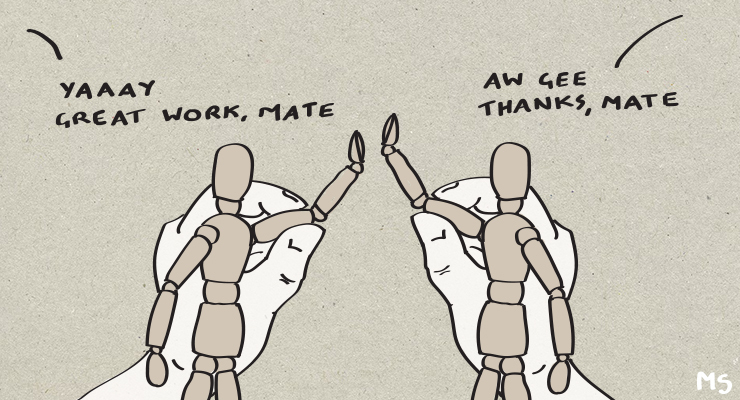
Next time you hear of a business lobby group calling for real wage cuts for workers, or read the anti-worker frothings of The Australian Financial Review urging that wages be slashed, remember that the pay of top CEOs in Australia is excluded from those self-serving musings. CEO pay is going up — rapidly.
So what’s new, you may think — isn’t CEO pay always rising rapidly? Not in 2020, when the pandemic saw a number of CEOs forego bonuses, either because their companies were struggling or, just as commonly, it would have been a shocking look at a time when Australians were struggling in a recession.
But now CEO pay has bounced back, according to the latest analysis of CEO pay of ASX 200 companies by the Australian Council of Superannuation Investors (ACSI), which looks at actual pay taken home by CEOs, compared to reported pay by companies.
The 2021 results were skewed by the success of Afterpay’s Anthony Eisen and Nick Molnar, who made over $100 million each after cashing out their options following the sale of the company to Square, so the results have to be adjusted to remove that outlier. But even that is illustrative: Afterpay, along with the rest of the buy-now-pay-later sector, is now garbage, haemorrhaging cash in a sector that, as Adam Schwab suggests, was filled with bubble stocks worth essentially nothing. That Eisen and Molnar found their Alan Bond doesn’t detract from the disconnect between real value and CEO remuneration.
Even without the Afterpay twins, a new record was set by CSL’s Paul Perrault, who took home nearly $59 million. CEO bonuses surged — the median ASX100 CEO bonus as a proportion of pay rose from a pandemic low of 31% to nearly 77%, the highest recorded in the seven years of analysis of ACSI, suggesting CEOs were keen to catch up after 2020.
Special mention, though, should be made of much-maligned (often by us) Alan Joyce, who didn’t take a bonus either in 2020 or in 2021. (Can you imagine the reaction right now if he had?)
The average bonus of the top ASX 100 companies also hit a new record of $2.31 million and median cash pay lifted from just under $2m to $2.8m.
That’s a 40% rise from 2020, or 36.5% above inflation, compared to what workers got in their before-tax pay in 2021 — growth of 2.3%.
Remember, many of these companies enjoyed profligate assistance from taxpayers in 2020 courtesy of JobKeeper, despite not needing it, and some never paid it back. And many of the lobby groups who represent them, and in some cases CEOs themselves, constantly demand real wage cuts for Australian workers. That includes tax dodgers News Corp, which lectures workers that they must face big real wage cuts when its CEO Robert Thomson enjoyed take-home pay of $27m, including a US$10m cash bonus.
Unlike US companies, Australian companies aren’t required to report CEO salaries in more meaningful terms: in the US, companies have to report CEO pay, inter alia, as a multiple of the average pay of their workforce, providing some context for the vast gulf between ordinary workers and executives.
Is all this rising pay warranted? The report doesn’t offer too much commentary except this pointed observation:
“As noted in prior studies, the persistence with which the same CEOs are included in the realised-pay Top 10 is strong evidence that CEO pay outcomes are not wholly explained by share price returns. In FY21, four members of each of the ASX100 and ASX101-200 realised pay Top 10s were included in the FY20 Top 10s…”
Perhaps workers could settle for just a fraction of CEO pay rises. Say, 10% of CEO salary growth. That would have meant around 4% wages growth in 2021. The first decent real rise Australians would have had in years.








It mystifies me why there is not more outrage at obviously unjustified executive remuneration, the obvious metric of gross inequity.
Qantas paid him $2mill and he destroyed the company. If they are going to pay a bonus at all this year they should reduce it to $20 mill. That will teach him.
How about reducing it BY $20M?
It looks like board rooms could save heaps by sacking the top jobs. It could be argued that they are legally required to do so, having shareholders’ interests as their responsibility.
Referring to the much maligned Alan Joyce, it seems to have rapidly faded from memory that he voluntarily took no salary from Qantas for much of 2020. That doesn’t mean that his subsequent management decisions have made much sense (like sacking staff who perform basic airline activities, like moving baggage), but it should be acknowledged.
Not correct – he said that he would forgo his bonus for 2020 but still trousered his basic $2M pa + perks
Ah – there you go – that is a big difference!!! He should be sacked he has made Qantas a lousy airline and trashed its reputation!! He should be sacked!